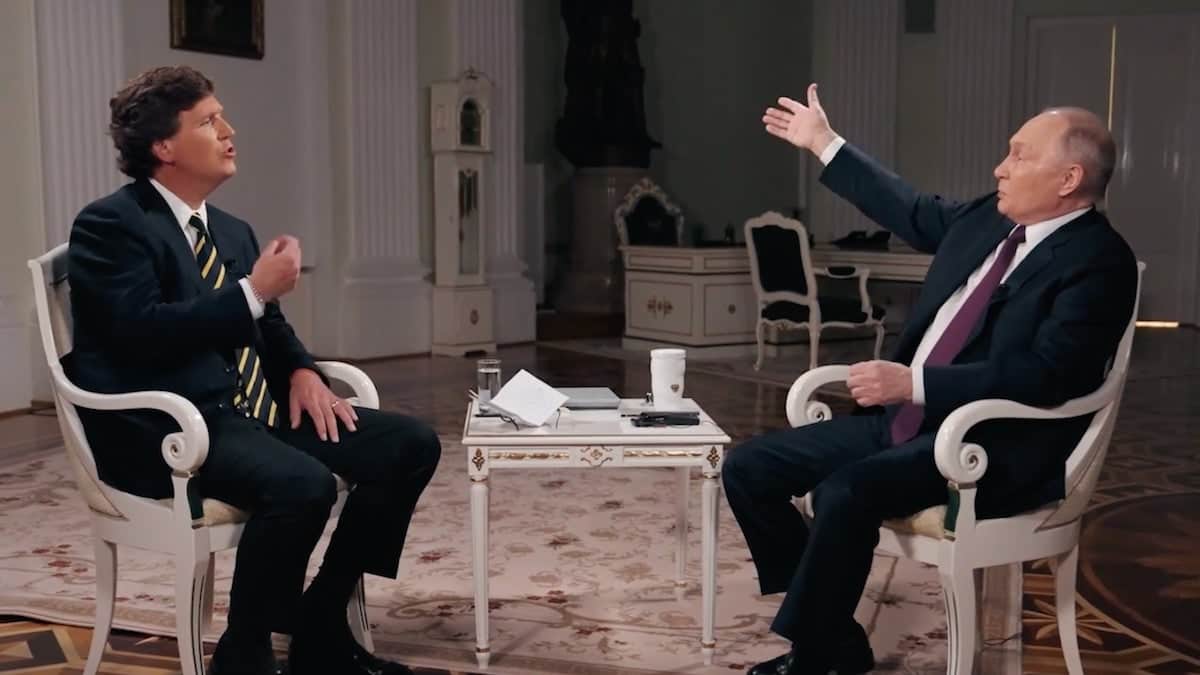by Rachel Marsden, Ron Paul Institute:

American establishment media spent the days in the run-up to Tucker Carlson’s interview with Russian President Vladimir Putin pre-judging it as propaganda, and soliciting the opinions of establishment figures, like former US secretary of state, first lady, and presidential candidate, Hillary Clinton, who dismissed Carlson a “useful idiot.”
TRUTH LIVES on at https://sgtreport.tv/
All this before they even had the slightest notion of the interview’s content. All they knew was that Putin would have an opportunity to speak, and that ever since Carlson left Fox News and turned independent, there wasn’t any obvious establishment figure to babysit him or control what went out. Worse, it would air on the X platform (formerly Twitter) owned by Elon Musk, who describes himself as a “free speech absolutist.” So it did not bode well for the kind of propagandistic framing that the Western establishment enjoys when it comes to locking down narratives under the guise of fighting a war on fake news.
The fact that journalists balked at the very notion of Carlson interviewing Putin reeked of professional jealousy. There isn’t a credible journalist out there who wouldn’t leap at the same opportunity if given the chance. Which is why, as journalists from CNN and the BBC confirmed, they’d long sought their own interviews with Putin — unsuccessfully. Presumably, Carlson’s format, audience reach, and freedom from establishment media constraints were appealing enough to land him the opportunity. Good for him. And for the journalistic record that can only benefit from any and all contributions.
It’s not like other media outlets don’t also benefit from their Western colleagues questioning Putin. I experienced this myself when invited to ask a question during one of Putin’s marathon press conferences. For the record, no one had any clue what I’d be asking. Neither did I, actually, as about five or six different themes suddenly went on spin cycle in my mind as I stood to speak. My question ultimately ended up being what Putin thinks about then President Donald Trump’s assertion that Islamic State had been defeated in Syria — Trump’s rationale for announcing the withdrawal of American troops just the day before. Putin’s response, in agreeing with Trump’s assessment, was newsworthy, and was quickly picked up by CNN and other Western media. The difference between me and Carlson? No competitors had to credit me as the source of the question. So the information Putin provided could safely be used without having to credit a “competitor” and denting any egos, as is often the case in press conferences. Not so with exclusive interviews.
Focusing on Carlson as some kind of flawed messenger serves as a convenient pretext for ignoring critical information and analysis. The fact that some journalists may think that Carlson’s questioning or approach was misguided — or that he didn’t push back enough for their tastes — doesn’t mean that they can’t subsequently take what Putin said and analyze it themselves. Every bit of information, analysis, or interview of any world leader is a valuable contribution. Litmus tests have no place in objective, impartial journalism. Many of those who criticize Carlson are the same ones who routinely search the Wikileaks database for leaked and dumped classified information to flesh out their own stories about various political issues and events that have since materialized — all while refusing to acknowledge that the publisher, Julian Assange, is as much of a journalist as they are.
Read More @ RonPaulInstitute.org




